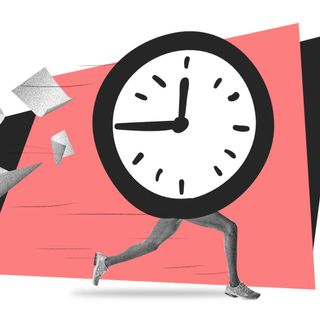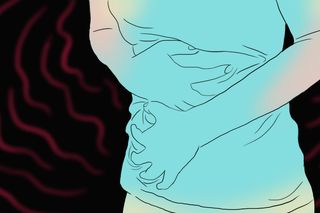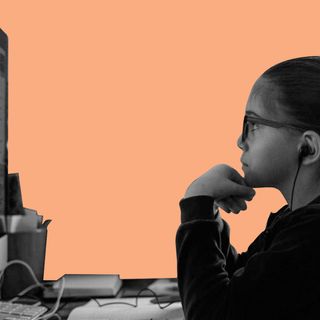
What It’s Like to Live With: Ulcerative Colitis
People tell me, “You have a disease because of which you don’t gain weight, I wish I had that.”

What It’s Like to Live With explores the stories of the loved ones living with and/or caring for people who see and experience every day a little differently.
In August 2017, when I was 27, I was in Boston and my stomach started aching a lot. I thought it was acidity because I’ve always had stomach issues. But in September, I went to the loo and saw that there was a lot of blood. That was the first time I thought I really need to go to the doctor. Until December, the doctors kept doing tests and put me on a few medications but nothing seemed to be improving. I came back to India and visited a gastroenterologist who immediately did a colonoscopy and I got diagnosed with ulcerative colitis. It’s an autoimmune disease that affects the innermost lining of the large intestine and rectum and symptoms could range from rectal bleeding and having bloody diarrhea to abdominal cramps and pain.
I was lucky I got diagnosed quickly enough because that’s not the case generally with autoimmune diseases. But the problems don’t stop with getting diagnosed. The doctor put me on oral medication and told me you’re going to have this disease for life. He said to take them for two years and we’ll assess the situation after I’ve finished this course. It was really distressing, my parents and I were sitting in his office, we were told I was going to have this disease for life, but the doctor never answered other questions such: as what is the disease, how do the medications work, do I need to make changes to my lifestyle? Nobody around me, including myself, knew how to deal with an autoimmune disease.
I went to AIIMS to a doctor who is supposed to be a big specialist, but it was the same problem — nobody was willing to listen to me. He would sit with me only for two minutes, and say take this enema, take this medication and you’ll be fine. I was struggling because every doctor saw me as a prescription. Nobody was willing answer some questions and it kept getting frustrating.
Related on The Swaddle:
What It’s Like to Live With: Muscular Dystrophy
Back then, I worked in the development sector, that involved being on the field a lot. But I couldn’t do it anymore, because I couldn’t be in a situation where I would not have access to a toilet, so I had to quit. I took up another job that I really hated. I used to go to the loo 10 times a day, in which 8 times it would just be blood coming out. All this was making me really exhausted because I was losing so much blood.
In January 2019, a friend referred me to a gastroenterologist who has been a godsend. She’s the first one who sat with me for an hour. I cried in her office and told her you’re the first person who has listened to me. She told me the medications weren’t working for me because my disease is at the end of my colon, and medicines weren’t reaching that far. She gave me localized versions and steroids which took a year-and-a-half to get off of. Now, I’m in remission, which means there’s a reduction in the symptoms. But last week, I started feeling a few of them again, and it was really scary, especially amid this pandemic, because people who have other health conditions are very vulnerable to contracting Covid19. That thought ticks up my anxiety levels.
Since my diagnosis, I haven’t been able to go out and eat wherever I want, because eating anything wrong would just aggravate my symptoms. I can’t drink more than a glass of wine, or eat raw vegetables, and there’s a constant feeling of uncertainty because you don’t know what will affect you. Last week I took some protein powder to gain weight and that didn’t sit well with me at all and my symptoms started coming back.
I can’t even go to all birthday and office parties, if I do, I have to carry my own food. When I’m not eating or drinking, a lot of people feel guilty and say they won’t order anything and I have to spend my time trying to make them feel comfortable and telling them I’m okay sitting there and just talking. It gets annoying after a point because if I’m saying I’m okay, don’t keep telling me I won’t order anything.
There’s a lot of other ignorant things people say. I’ve always been underweight, and due to this disease, it’s even more difficult to gain weight, so people tell me, “You have a disease because of which you don’t gain weight, I wish I had that.” Or try homeopathy and natural stuff, why are you on medication when you’re so young. And also, fix your eating habits.
Then there are statements from people who really love you, like your parents and friends. When they say “Don’t worry, it’ll be okay,” it’s really hard to constantly keep reminding people that that’s exactly what it’s not going to be, it’s not going to be okay. While a lot of people with my version of the disease live their whole life without the disease progressing at all, there are some others for whom it progresses. So I have no idea what’s going to happen to me. It’s tiring and upsetting to keep reminding people that it’s not going to be okay because it’s not going away.
I’ve also had to manoeuvre my ways around the disease. For instance, on the first day of the job I’m currently in, when a colleague and I were on our way for a meeting, one of my first conversations with her was about what I suffer from. I told her I might have to leave the meeting to suddenly rush to go to the loo, so just know this is why. That’s really awkward. Traveling for work has become difficult, I can’t go to places where I don’t have access to food that won’t harm me. Even when I’m traveling for vacations, I have to increase my budget because I need to eat at good places and that reduces the number of times I can travel.
I just wish people spoke more about autoimmune diseases because no one understands what they entail. It’s so tiring to deal with making them aware of it and then on top of that, to also listen to comments like you brought this upon yourself.
This interview has been condensed and edited for clarity. As told to Anubhuti Matta.
Anubhuti Matta is an associate editor with The Swaddle. When not at work, she's busy pursuing kathak, reading books on and by women in the Middle East or making dresses out of Indian prints.
Related


Monsoon Forces Us to Consider: How Does Lighting Impact Our Mood?
